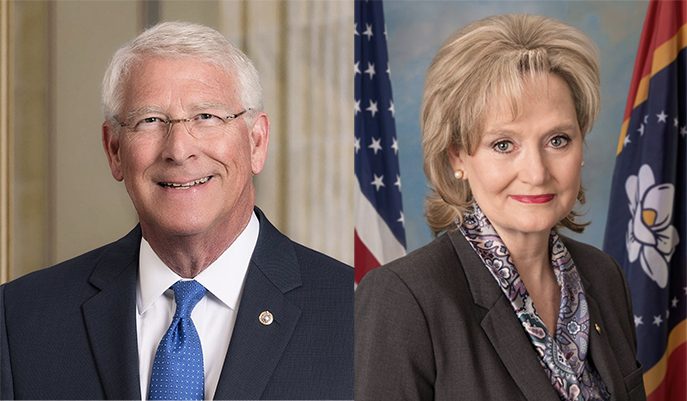
The conference report was passed in both chambers on Wednesday after minimal changes to the original bill.
The Mississippi House and Senate have come to an agreement on the implementation of a medical marijuana program for the state. The bill, SB 2095, has been passed with a conference report and will now head to the Governor.
Governor Tate Reeves will either have the option of signing the bill into law, allowing it to go into law without his signature, or vetoing the bill.
Many Mississippians have been waiting over a year to see a medical marijuana program manifest in the state. Some 74 percent of the population voted in favor of a medical marijuana program, with roughly 64 percent of that group supporting Initiative 65 on the ballot in 2020.
After a failed attempt at a “backup plan bill” in 2021, the striking down of Initiative 65 by the Mississippi Supreme Court due to an improper certification of the ballot initiative, and months of back and forth between the House, Senate and Governor’s office regarding the specifics of the bill, the 2022 version of the medical marijuana program seems to be the one to stick.
Senator Kevin Blackwell called the Senate’s 46 to 4 vote for passage a “veto proof vote”
Senator @KevinBlackwell5, author of the #medicalmarijuana bill, comments on its passage in the Senate with a “veto proof vote” and says he is hopeful the House will take it up this afternoon. #msleg pic.twitter.com/0MfSkGeA3m
— Yall Politics (@MSyallpolitics) January 26, 2022
The bill was taken up in the House later that afternoon and passed by a vote of 103 to 13
One of the key individuals in the drafting of the bill, Rep. @LeeYanceyMS said this regarding today’s votes #msleg #medicalmarijuana pic.twitter.com/doAVGNEgup
— Yall Politics (@MSyallpolitics) January 26, 2022
“Very thankful the bill passed and doing what’s right for the people in the state of Mississippi,” said Representative Chris Bell.
Here are the major points of the bill as presented by the Senate in 2022:
- The program should begin accepting applications, registering and licensing ID cards no more than 120 days after passage.
- 3.0 ounces allowed per month to individual medical marijuana card holder
- Potential card holders must have an established relationship with a physician to be prescribed medical marijuana
- Mississippi Department of Health will be the ultimate oversight authority to the program (the conference report removed the Mississippi Department of Agriculture and Commerce from the program entirely.)
- MDAH will have ability to contract with outside entities.
- The Department of Revenue will be responsible for licensing, inspection and oversight of dispensaries.
- Allows cultivators and processors to be located in industrial, agricultural and commercially zoned areas.
- Those in commercial areas must be approved by the local governing authority.
- A city or county will have authority to enact ordinances or regulations regarding the location of a dispensary.
- Dispensaries shall not be within 1,000 feet of a school, church or childcare facility.
- However, a waiver can be applied for, no less than 500 feet from these entities.
- A city or county will have up to 90 days to opt out of the program once the bill is passed.
- Banks will be provided legal cover in order to offer services to persons licensed to engage in a medical cannabis business.
- There will be a 5 percent excise tax and the product is subject to state sales tax.
With the implementation of the program a nine-member advisory committee will be formed. Those to sit on the committee include: 3 members appointed by the Governor, 3 members appointed by the Lt. Governor, and 3 members appointed by the Speaker of the House. It is being established to advise the Legislature about medical cannabis and cannabis product, patient care, services, and industry. The Committee is to meet at least two times a year.
Because marijuana is still a Schedule 1 narcotic in the federal government’s eyes, some allowances will be made under the state law. For instance, the purchase, transportation, possession (under monthly amount) of medical marijuana will be allowed, as well as reimbursement to a caregiver by the patient who is prescribed cannabis but needs assistance in obtaining it monthly.
Those who are card holders will also be permitted to purchase equipment that is used to ingest medical cannabis. The bill does not discriminate against any particular way to take medical cannabis be it smoking, vaping or through the use of edibles.
The bill will not protect employment just because an individual is prescribed medical marijuana. The language would not prohibit an employer from refusing to hire or fire an individual who uses marijuana. Employers are also not prohibited from enforcing a drug testing policy at their workplace. No legal action can be taken by an employee if an employer chooses not to allow individuals who test positive for marijuana use to work there.
Those who are licensed to participate in the program, whether that be card holders or distributors, are also required to continue to follow federal guidelines regarding operating machinery or motor vehicles according to the United States Department of Transportation.
Not all legislators are in support of the program that was outlined. Senator Angela Hill showed concern over who would be permitted to participate in the business side of the industry. She raised concerns over the allowance of individuals who has previously been convicted of white-collar crimes, not being prevented from participating.
Senator Angela Hill shares concerns over the passage of SB 2095 over #medicalmarijuana is not being treated like medicine in regards to who can cultivate and process it with a criminal background #msleg pic.twitter.com/enaHxMKXKO
— Yall Politics (@MSyallpolitics) January 26, 2022
Senator Hill believes medical cannabis is not being treated like medicine.
“There is no pharmacist involved, no prescription involved, no set dosage or particular product,” said Hill. “One of my biggest concerns is that these crimes you can have and still get a license to work in the industry. There is a laundry list of crimes like racketeering, money laundering, drug felonies, all kinds of crimes you can have in your background.”
Senate no votes on the bill included: Senator Angela Hill, Senator Jennifer Branning, Senator Kathy Chism and Senator Jeff Tate.
In the House: Rep. Shane Barnett, Jill Ford, Chris Brown, Billy Calvert, Stacey Hobgood-Wilkes, Steve Horne, Timmy Ladner, Dana McLean, Ken Morgan, Jansen Owen, Omeria Scott, Troy Smith, Brady Williamson.
**Contributions from Anne Summerhayes, Capitol Reporter**











